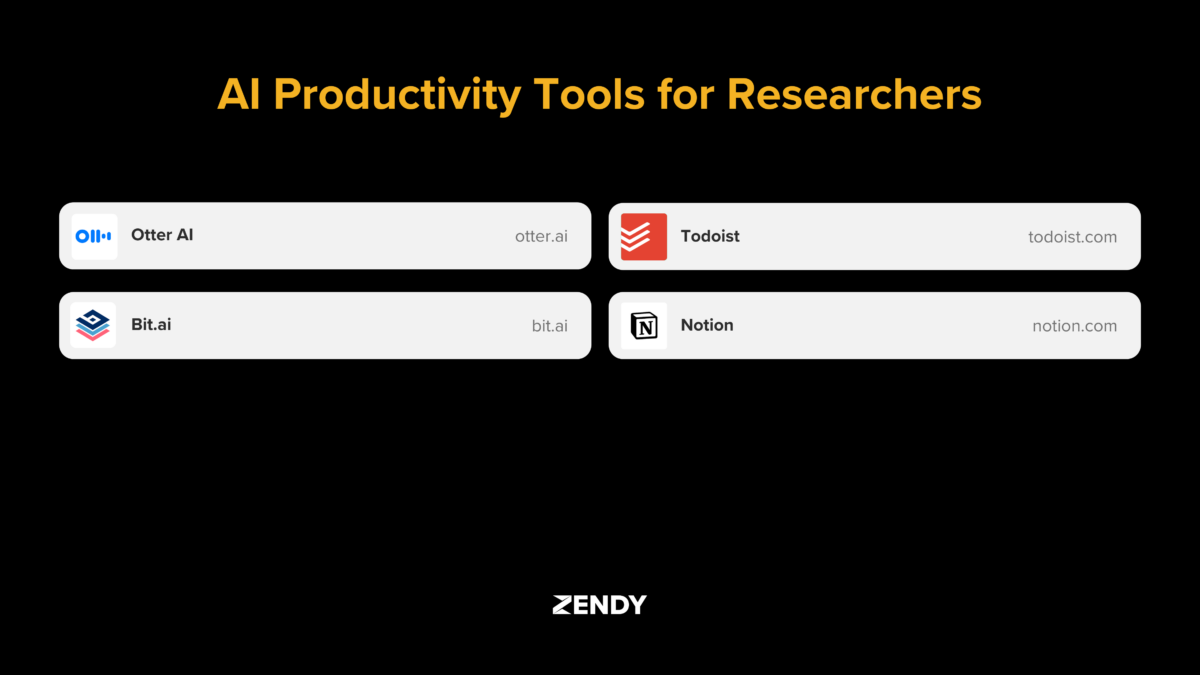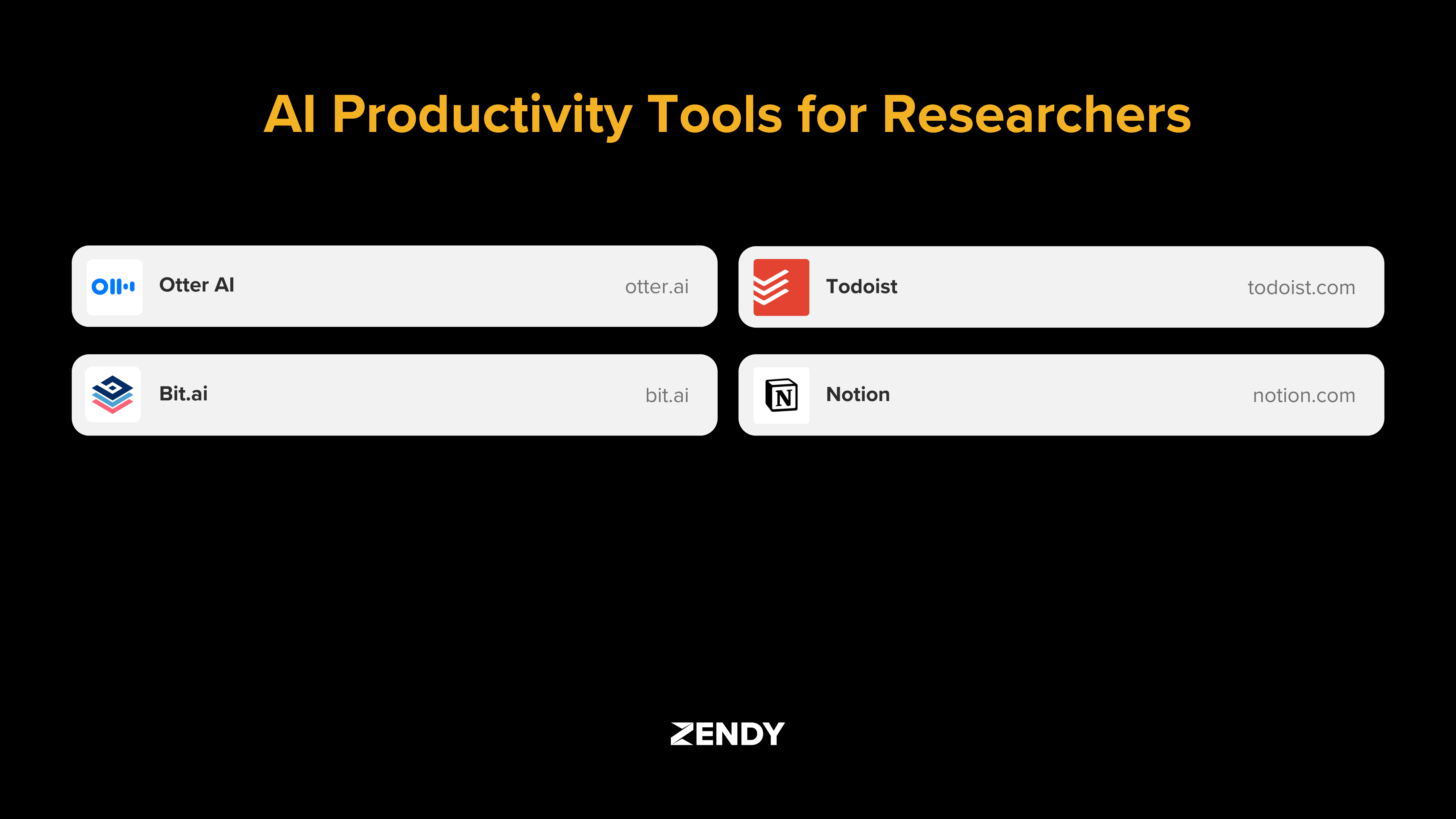
AI productivity tools are digital platforms that use artificial intelligence to help researchers work more efficiently. Unlike traditional software, these tools use algorithms and machine learning to automate routine tasks, process large amounts of information, and generate insights.
Traditional productivity apps rely on manual input. AI-powered tools can learn from user habits, interpret natural language, and offer smart suggestions. For researchers, this means tasks like transcription, organisation, and project management happen faster with less effort.
The benefits of AI-powered productivity tools for students to enhance academic workflows include:
- Time efficiency: Automated transcription and summarisation
- Accuracy: Reduced manual errors in data processing
- Organisation: Smart categorisation of notes, tasks, and references
- Collaboration: Real-time sharing and editing of documents and projects
Quick comparison of Otter.AI, Bit.ai, Notion, and Todoist
AI productivity tools offer different features for research, writing, collaboration, and task management. Understanding which tool handles which function helps you choose the right combination.
| Tool | Transcription | Document Collaboration | Task Management | Knowledge Organization |
| Otter.AI | Yes | Limited (shared notes) | No | Keyword search, highlights |
| Bit.ai | No | Yes | Limited | Centralized workspace |
| Notion | No | Yes | Yes | Databases, linked notes |
| Todoist | No | Limited (shared tasks) | Yes | Project lists |
Each tool provides a free version, making them accessible to students and researchers who want to try basic features. Advanced features for collaboration, automation, and AI-powered suggestions are available in paid plans.
Best-fit scenarios for each tool:
- Otter.AI: Recording and transcribing interviews, lectures, or meetings
- Bit.ai: Collaborative writing, team documentation, and organising research materials
- Notion: Managing literature reviews, creating structured research databases, and planning projects
- Todoist: Tracking deadlines, managing tasks for long-term research projects
Where Otter.AI fits in the research workflow
Otter.AI uses speech-to-text technology to convert spoken words into written text. In research, it captures and documents conversations, meetings, interviews, and lectures automatically. The tool processes audio in real time and generates a digital transcript that can be reviewed and edited after the session.
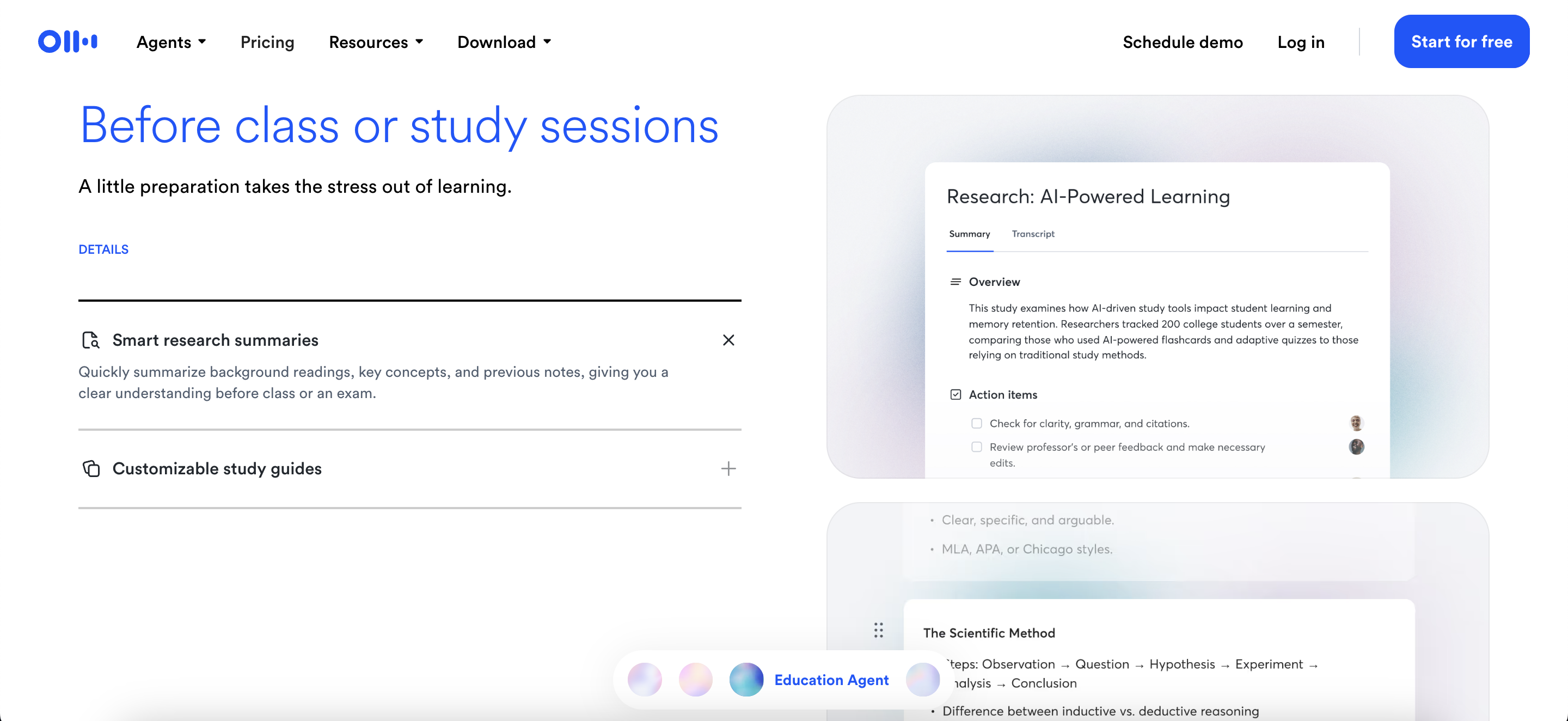
The platform provides real-time transcription, converting speech into text as it happens. This works during interviews or classroom lectures, recording and transcribing spoken content simultaneously. The tool identifies and labels different speakers, helping track who is talking in group settings. Transcription accuracy depends on audio quality, background noise, and speaker clarity.
Once a transcript is created, it becomes a searchable text document. You can search for specific phrases, topics, or keywords within the transcript to locate information quickly. The platform highlights keywords or important sections, making it easier to analyse large volumes of qualitative data. This searchable database supports reviewing, coding, and referencing spoken information during research analysis.
How Bit.ai streamlines collaborative writing
Bit.ai is a document collaboration platform that uses AI to help research teams and co-authors work together on academic projects. It creates a single online space for groups to create, edit, and organise research documents.
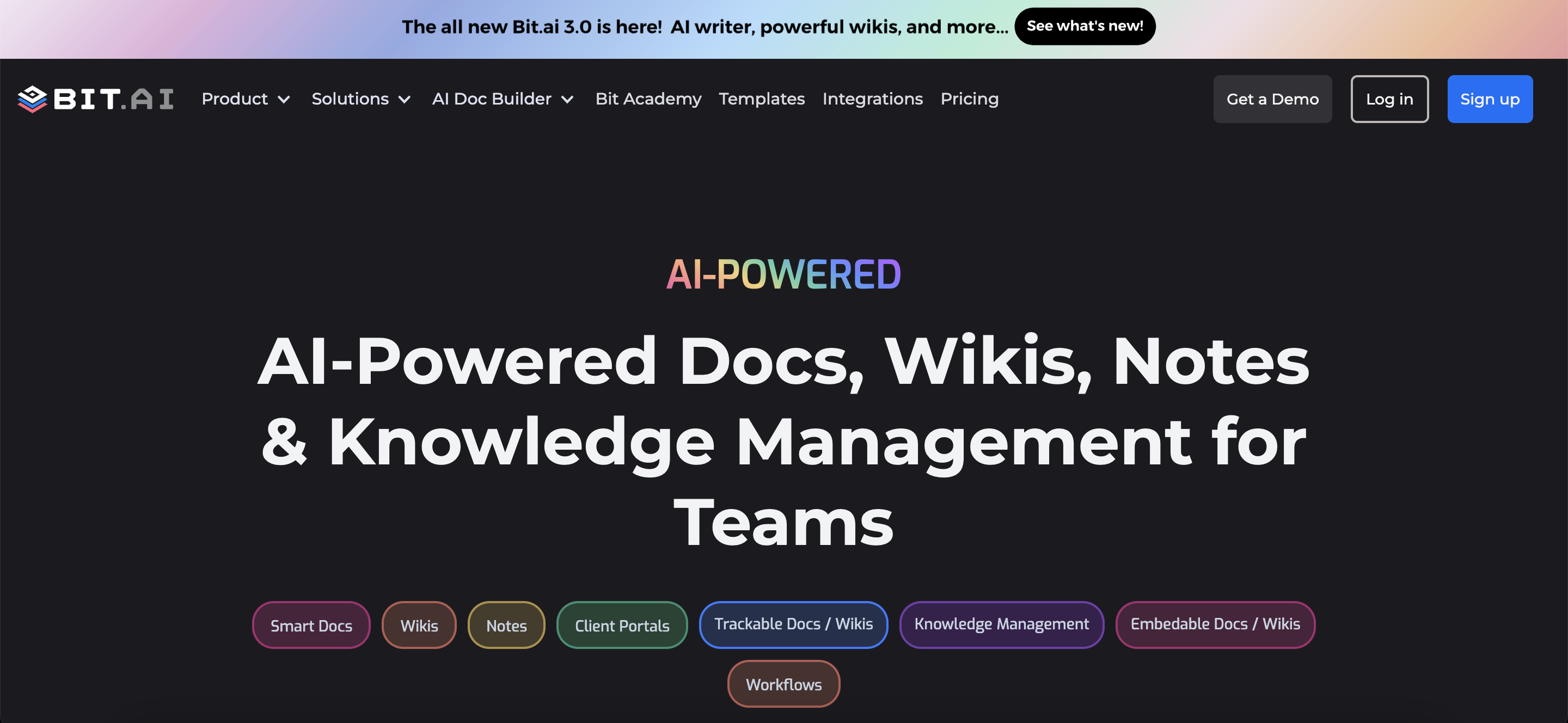
The platform allows users to embed rich media such as images, videos, and interactive charts directly into documents. So as a team, you can edit the same document simultaneously, and changes appear instantly for everyone. AI features suggest content improvements, recommend citations, and help organise ideas as users write.
Bit.ai provides a centralised workspace where teams can store and arrange research materials, references, and notes. Users create folders for different projects or topics, making it easier to locate specific files and information. All team members can access shared resources and contribute to the collective knowledge base.
Managing projects and deadlines with Todoist AI
Todoist AI handles project management for research workflows that include multiple deadlines, contributors, and project phases. The platform helps with planning and tracking ongoing or long-term academic projects, such as group research papers, lab work, or thesis development.
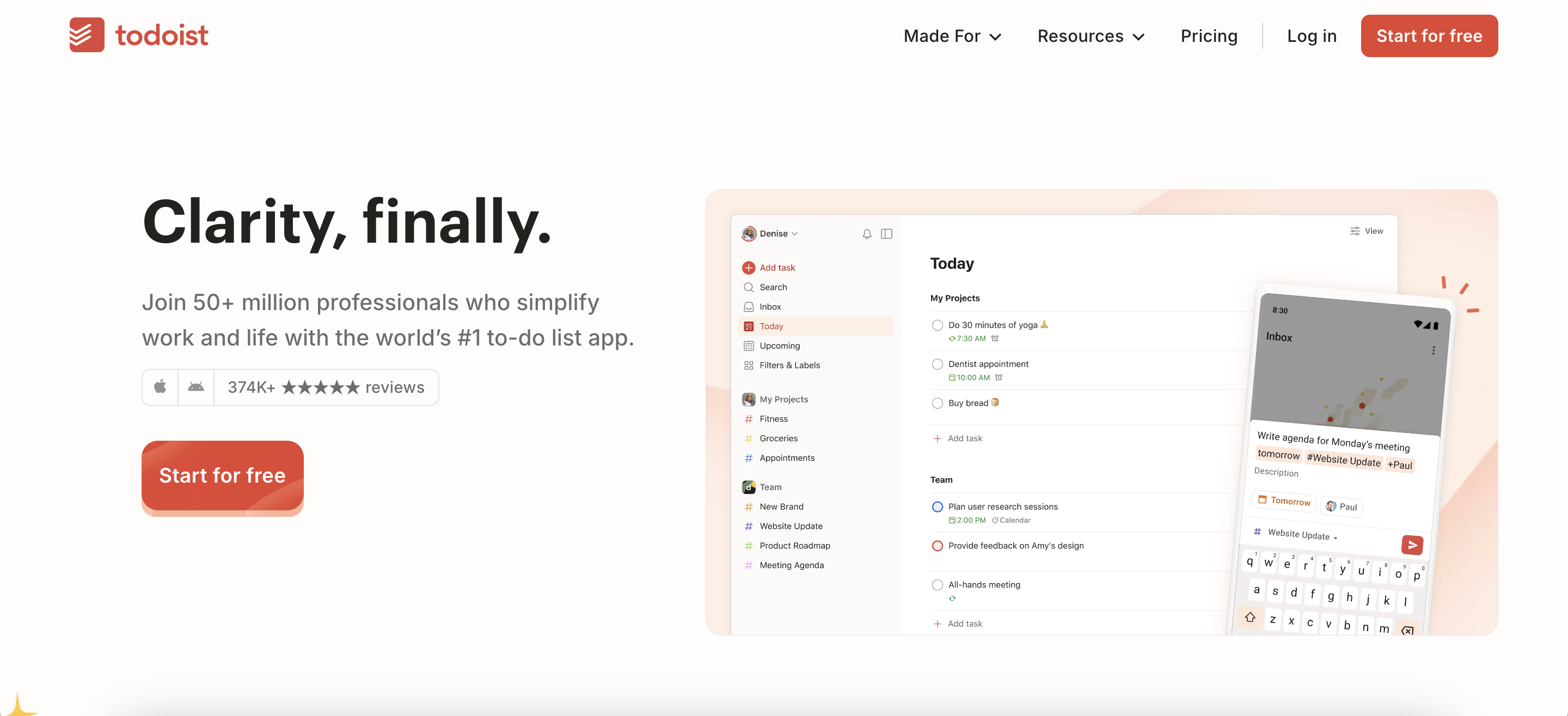
The AI task management tools use AI to rank tasks according to their deadlines, dependencies, and importance within each stage of a research project. The system analyses which tasks are most urgent, identifies which activities rely on others being completed first, and adjusts priorities as new information is added or project phases change.
Smart scheduling features include intelligent allocation of time blocks for each task based on deadlines and workload. The platform generates automated reminders for important milestones, such as draft submissions, experiment dates, or meetings. When timeline changes occur, Todoist AI updates the schedule and sends notifications to keep team members aware of upcoming deadlines.
Organising knowledge bases in Notion AI
Notion AI combines note-taking, databases, and task management in one platform. Researchers use Notion AI to organise articles, research notes, and project documents in a single, structured environment. This tool supports literature management and research organisation for individuals and teams.

The AI processes and summarises text from research notes, meeting minutes, or uploaded literature. It generates concise overviews of long passages and extracts main ideas from academic content. The system answers user questions by searching through stored notes and documents, providing relevant information based on previous entries.
Notion AI offers database templates designed for academic workflows:
- Literature review templates: Fields for citation details, summaries, and key findings
- Data collection templates: Record variables, sources, and results
- Research planning templates: Structure timelines, objectives, and progress trackers
Each template can be customised to meet the requirements of a specific research process.
Integrating tools with reference managers and libraries
Best AI tools for students often work together with reference managers and digital research libraries. This setup helps researchers organise sources and manage citations more efficiently. Many tools support direct or indirect connections to widely used academic platforms.
Zotero and Mendeley are reference management systems that collect, organise, and cite academic sources. Both platforms have integration options with AI productivity tools. Some document collaboration platforms and note-taking apps allow users to export references in formats compatible with these reference managers. Browser plugins and word processor add-ons let users insert citations and bibliographies into research documents.
Zendy’s AI-powered research library works alongside productivity and reference management tools. Users can discover and access full-text articles through Zendy, then export citations to reference managers. Zendy’s platform supports AI summarisation, key phrase highlighting, and organised reading lists, which streamline literature reviews and project planning. When used with collaborative writing or task management tools, Zendy provides a central source for reliable academic content and citation data.
Choosing the right tool mix for your research
Selecting AI productivity tools for students and research involves matching tool features to specific project requirements. The best combination depends on research objectives, group size, and preferred working methods. Each tool offers different functions, so understanding your workflow is the first step.
Assessment criteria include research type, collaboration needs, and technical requirements. Qualitative research involving interviews and discussions often uses transcription tools like Otter.AI, while quantitative projects may focus on organisation and project management. Research conducted in teams benefits from document collaboration platforms that support shared editing and centralised knowledge.
Technical requirements include compatibility with institutional systems, device support, integration with reference managers, and data privacy standards. Consider whether the tool works on preferred devices and integrates with other software used for citations or data storage.
Many AI productivity tools offer free versions with core features suitable for individual students or small projects. Larger teams or advanced projects may use paid plans that unlock collaboration, automation, or additional storage. Institutional licenses sometimes provide access to premium features at no individual cost.
Implementation tips for secure compliant use
Academic and institutional environments require careful management of data privacy and security when using AI productivity tools. Each tool interacts with research data differently, so understanding how information is handled protects both individual and institutional interests.
GDPR compliance applies to any tool that processes or stores personal information of individuals in the European Union. Institutional data policies often include guidelines on where research data may be stored, who can access it, and how long it can be retained. Secure handling involves using encrypted connections, selecting tools with end-to-end encryption, and ensuring sensitive files are shared only within approved platforms.
Introducing AI tools to research teams involves several steps:
- Testing phase: Select a small group to test the tool and provide feedback
- Documentation: Create clear guidelines for using tools within research workflows
- Training: Help team members understand secure and responsible usage
- Role establishment: Set up administrators, data managers, and regular users
- Regular reviews: Assess whether tools continue to meet privacy requirements
Discover Zendy for limitless research access
Zendy, AI AI-powered research library, acts as a central research hub that connects with AI productivity tools used in academic work. The platform provides access to scholarly articles, journals, and academic resources across disciplines.
Features such as ZAIA, AI assistant for research, AI-powered summarisation, key phrase highlighting, and organised reading lists help manage literature and support research projects. You can export citations to reference managers and create structured workflows for academic tasks.
For researchers looking to integrate comprehensive literature access with their productivity workflow, Zendy’s AI-powered research library provides the foundation for efficient academic research.
FAQs about AI productivity tools for students and researchers
How do AI transcription tools handle sensitive interview recordings?
Most AI productivity tools use encryption and privacy controls to protect sensitive recordings. Researchers need to verify compliance with institutional data policies and obtain participant consent when managing such data.
Can Otter AI transcribe interviews without internet connection?
Otter.AI requires internet connection for real-time transcription. Some features work offline with limited functionality, but full transcription capabilities need online access for processing.
Which productivity tool works best with Zotero and Mendeley?
Notion provides flexible integration through its API, allowing various connections with citation management software. Bit.ai offers direct export features for popular reference managers like Zotero and Mendeley.
Do these AI tools support research content in languages other than English?
Language support varies by tool. Otter AI includes multiple language transcription capabilities, while Notion AI processes text in various languages for research content management.
